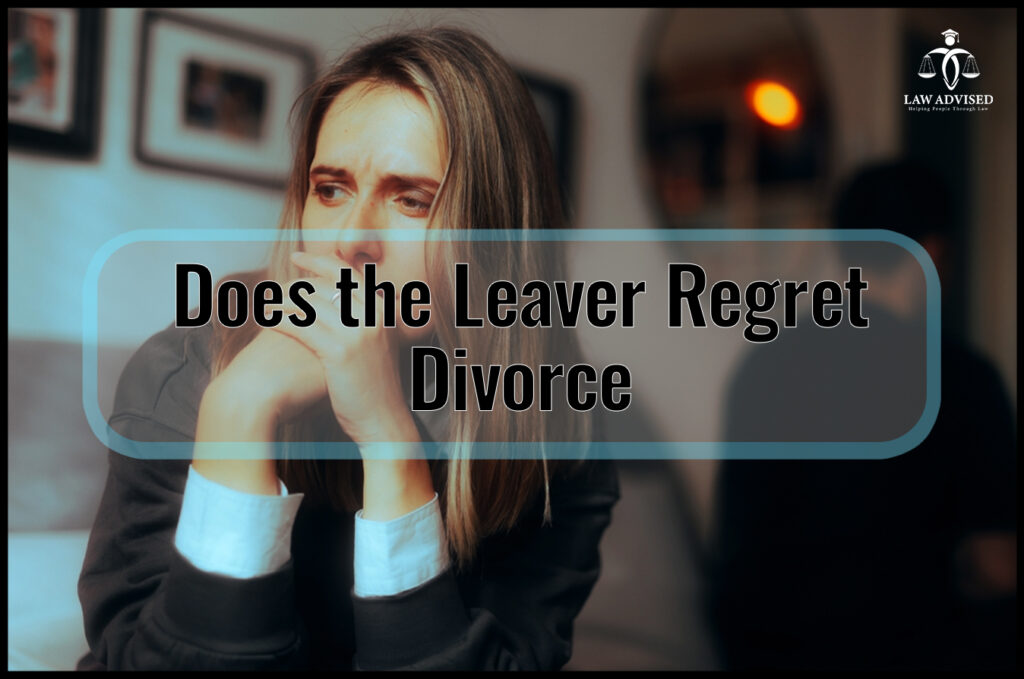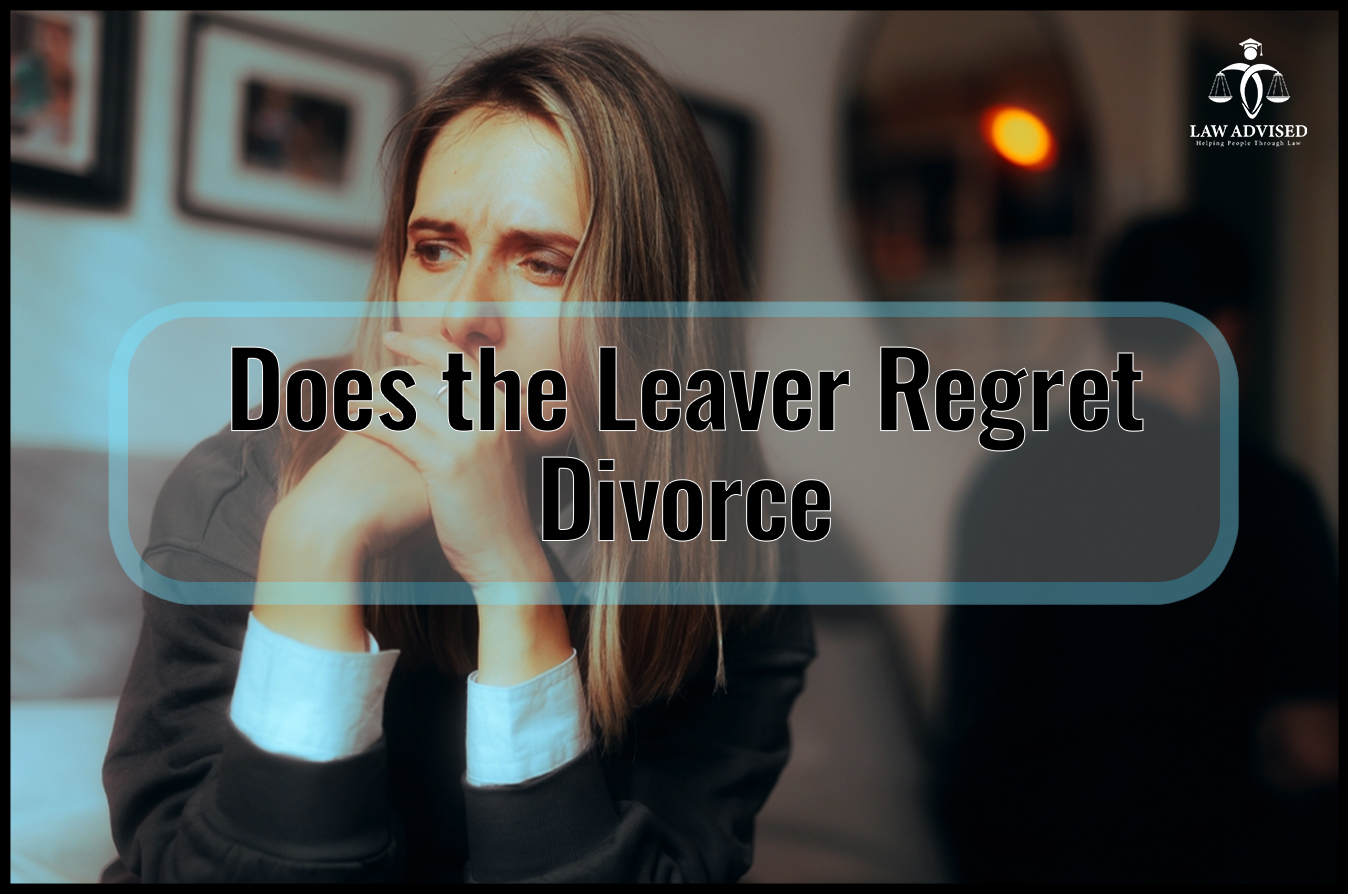Leavers often regret divorce due to the emotional and financial repercussions involved. Divorce is a complex and life-altering decision that can have long-lasting effects on those involved.
Whether the decision to divorce was mutually agreed upon or initiated by one party, it is not uncommon for leavers to experience feelings of regret. The emotional toll of a divorce can be overwhelming, and individuals may struggle with feelings of sadness, loneliness, and loss.
Additionally, the financial implications of divorce, such as the division of assets and ongoing support payments, can further contribute to regret. While every situation is unique, it is important to recognize that divorce is a significant life event that can leave a lasting impact on individuals, regardless of whether they are the initiator or not.
The Emotional Rollercoaster Of Post-divorce Regret
Divorce is a deeply personal and emotionally charged process that can have lingering effects on both parties involved. While much attention is often focused on the emotions felt by the one being left behind, it is important to also acknowledge the complex emotions experienced by the individual who initiates divorce.
Post-divorce regret is a phenomenon that many leavers may encounter, despite their decision to end the marriage. This emotional rollercoaster can be overwhelming and difficult to navigate.
Initially, the leaver may experience a mixture of relief and liberation from a troubled relationship. However, as time progresses, feelings of sadness, guilt, and doubt can surface. The leaver may question their decision, wonder if they could have done more to salvage the relationship or feel regret for the pain caused to their ex-spouse.
It is important to acknowledge and validate these emotions. The leaver deserves support and compassion as they navigate their journey of healing and self-reflection. Seeking therapy, talking to close friends or family members, and engaging in self-care activities can help the leaver process their emotions and find closure.
Unforeseen Consequences: The Damage Of Divorce Regret
Divorce is a life-altering decision that can have far-reaching consequences, often filled with regret and remorse. The emotional toll it takes on individuals can have a lasting impact on their mental health, leading to feelings of anxiety, depression, and loneliness. The regret over the dissolution of a marriage can also have a ripple effect on family and interpersonal relationships. Children may be caught in the crossfire, experiencing confusion, anger, and a sense of loss.
Close friendships and extended family ties may be strained or severed altogether. Beyond the emotional realm, divorce regret can also manifest in financial implications. The division of assets can leave one or both parties feeling resentful and remorseful about the financial impact of the breakup. The regret of divorce can have far-reaching consequences.

The Facets Of Divorce Regret Explored
Divorce is a multifaceted experience that can leave individuals pondering their decision and questioning what might have been. The leaver, the party who initiated the divorce, may find themselves in a unique position where regret may arise. While some may regret the decision to divorce, others may find themselves regretting the marriage itself. This differentiation is important as it reflects the individual’s perspective and mindset.
Several factors contribute to post-divorce regret. Hindsight bias often kicks in, making individuals romanticize the past and believe that things could have been different if they had stayed in the marriage. Loneliness can also amplify feelings of regret, particularly when individuals compare their current situation to the companionship they had during the marriage.
Societal pressures play a role as well. The stigma associated with divorce can lead individuals to question whether they made the right choice, especially if they feel judged by others. It’s important to note that regret in divorce doesn’t necessarily imply a desire to reconcile or go back to the past, but rather an acknowledgment of the complexity and emotional toll it takes.
Self-reflection and personal growth are essential in processing regret. Accepting that regrets are a natural part of life and using them as opportunities for growth and learning can help individuals find peace and move forward.
Moving Forward: Coping With Divorce Regret
Divorce is often a difficult and emotionally draining experience. Many people find themselves questioning their decisions and experiencing regret. However, it is important to remember that every individual’s journey is unique, and there is no one-size-fits-all answer to whether or not a leaver regrets divorce.
The key to moving forward and coping with divorce regret is to develop strategies that allow for healing and personal growth. Seeking professional help from therapists or counselors can provide valuable insights and support. Building a strong support system of friends and family is also crucial in navigating the challenges that come with divorce.
Embracing forgiveness is another important step in finding healing. Letting go of guilt and resentment can open up opportunities for rebuilding a fulfilling life. This involves forgiving both oneself and one’s former partner, understanding that mistakes were made, but dwelling on them will only hinder personal growth.
Remember, divorce regret is a natural part of the healing process, and with time, patience, and support, it is possible to find a sense of peace and happiness again.
Embracing The Choices We Make: The Path To Self-acceptance
Divorce is a life-altering decision, and it is natural to wonder if the leaver regrets it. However, embracing the choices we make is an essential step towards self-acceptance. Accepting and embracing the decision to divorce allows us to recognize the lessons learned and the personal growth gained from the experience. It is an opportunity to reflect on our journey and acknowledge the bravery it took to make such a significant change.
Through divorce, we have the chance to cultivate a new sense of self-worth and empowerment. The process may be challenging, but by prioritizing our well-being and learning to love ourselves, we can emerge stronger and more self-assured. It is important to remember that regrets are a part of life, but they do not define us. Instead, we can focus on embracing our decisions and using them as springboards for personal growth and a brighter future.
Debunking Societal Myth: The Stigmatization Of Post-divorce Regret
Breaking down the societal expectations and stereotypes surrounding divorce regret Challenging the notion that regret equals failure or weakness. Advocating for empathy and understanding towards those experiencing post-divorce regret
Divorce is often seen as the end of a chapter, but what happens when one or both parties experience regret? Unfortunately, society tends to stigmatize those who express remorse after a divorce, viewing it as a sign of failure or weakness. This mindset is not only unfair but also detrimental to individuals who are going through a difficult period of reflection and healing.
We need to challenge the notion that regret automatically equates to failure. Divorce is a complex emotional journey, and it is natural for individuals to question their decisions and feel regret. Instead of judging, we should foster empathy and understanding. By doing so, we create a supportive environment that acknowledges the complexity of human relationships and allows individuals to heal in their own time and on their terms.
Frequently Asked Questions For Does The Leaver Regret Divorce
Are There People Who Regret Getting A Divorce?
Yes, some people regret getting a divorce because they realize the impact it has on their lives and relationships.
What Are Some Common Reasons Why People Regret Getting A Divorce?
Some common reasons why people regret getting a divorce include feelings of loneliness, financial difficulties, regrets about the impact on children, and the realization that their problems could have been resolved through therapy or counseling.
Do Leavers Often Regret Their Decision To Divorce?
Yes, leavers often experience regret after a divorce when they realize the loss of the familiar, the difficulties of starting over, and the impact on their emotional well-being.
How Long Does It Take For Someone To Regret Divorcing Their Partner?
The timeline for feeling regret after a divorce can vary from person to person, but it often occurs within the first year to several years after the divorce.
Can Regret Over A Divorce Lead To Reconciliation?
Regret over a divorce can sometimes lead to reconciliation if both parties are willing to work on their issues, seek therapy or counseling, and rebuild trust and communication.
How Can Someone Cope With Regret Over Divorcing Their Partner?
Coping with regret over divorcing a partner can be challenging, but seeking therapy, joining support groups, practicing self-reflection and forgiveness, and focusing on personal growth can help in the healing process.
Is It Common For People To Feel Regret After Divorcing A Long-term Partner?
Yes, it is common for people to feel regret after divorcing a long-term partner due to the significant emotional investment and shared history that may be difficult to replace.
What Can Someone Do If They Regret Divorcing Their Partner?
If someone regrets divorcing their partner, they can try to reach out, express their feelings, and open a line of communication to explore the possibility of reconciliation or finding closure.
Conclusion
To wrap up, divorce is a complex and emotionally charged process that can leave both parties with regrets. The leaver may question their decision, wondering if they made the right choice. However, it’s important to remember that every situation is unique, and hindsight is not always accurate.
The key is to prioritize open communication, understanding, and reflection to minimize regrets and move forward in a positive direction. Ultimately, the decision to divorce is personal and varies from individual to individual.
Ismail Hossain is the founder of Law Advised. He is an Divorce, Separation, marriage lawyer. Follow him.





Leave a Reply